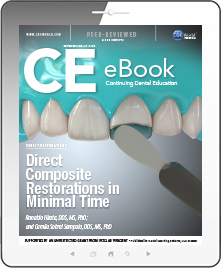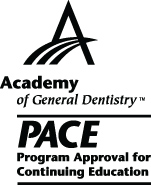CDEWorld > eBooks > Direct Composite Restorations in Minimal Time


ADA CERP is a service of the American Dental Association to assist dental professionals in identifying quality providers of continuing dental education. ADA CERP does not approve or endorse individual courses or instructors, nor does it imply acceptance of credit house by boards of dentistry. Concerns or complaints about a CE provider may be directed to the provider or to ADA CERP at www.ada.org/cerp/

Approved PACE Program Provider. FAGD/MAGD credit. Approval does not imply acceptance by a state or provincial board of dentistry, or AGD endorsement. 1/1/2023 to 12/31/2028. ID # 209722.
eBook
Released: Wednesday, September 30, 2020
Expires: Saturday, September 30, 2023
Direct Composite Restorations in Minimal Time
By Ronaldo Hirata, DDS, MS, PhD; and Camila Sobral Sampaio, DDS, MS, PhD
Commercial Supporter: Ivoclar Vivadent
The use of direct composites in restorations for some clinical procedures can be simpler and quicker than use of ceramics and other technologies that in recent years have often resulted in the practitioner doing too much restoring. The speed inherent in use of composites is particularly important in the era of coronavirus (COVID-19), when both practitioner and patient want less contact with each other. Moreover, resin composite restorations can be performed in a single appointment.
LEARNING OBJECTIVES:
- Describe how to perform restorations with resin composite in a single appointment.
- Consider how to avoid failures, fractures, and chipping.
- Describe how to perform a variety of restorations with universal composites.
About the Authors
Ronaldo Hirata, DDS, MS, PhD
Private Practice
Curitiba, Brazil
Assistant Professor of Biomaterials and Biomimetics
New York University
New York, New York
Camila Sobral Sampaio, DDS, MS, PhD
Private Practice
Santiago, Chile
Universidad de los Andes
Santiago, Chile


